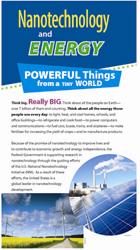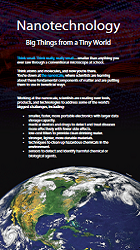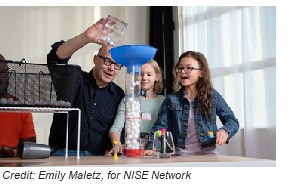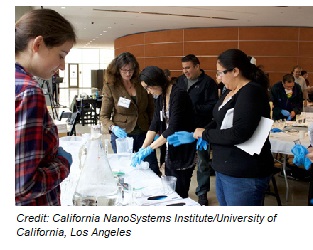Educational Resources for K-12 Teachers

Nanotechnology is a part of various scientific disciplines, such as physics, biology, chemistry, materials science, engineering, and more. As such, it can be taught at various levels and woven into various types of STEM learning.
Classroom Resources
CK-12 Foundation – Flexbooks: With a guiding philosophy that learning is a personal journey, CK-12 Foundation was founded with the mission to let everyone learn in his or her own way, by pairing high-quality content with the latest technologies and providing these tools to teachers for free.
  |
|
Contact us for up to 400 copies of our educational brochures for students and anyone eager to learn. |
The High School Nanoscience Program is a joint effort of the California NanoSystems Institute (CNSI) and the NSF-funded IGERT Materials Creation Training Program (MCTP). The purpose of the program is to bring nanoscience to high school classes in the Los Angeles Unified School District (LAUSD) and throughout the greater Los Angeles area.
Molecularium: The Molecularium® Project is the flagship outreach and education effort of Rensselaer Polytechnic Institute’s Nanotechnology Center, bringing audiences worldwide into the amazing nanoscale world of atoms and molecules.
NanoDays: This is a nationwide nanotechnology festival that take place for one week each year at more than 200 science museums and other locations across the country from Puerto Rico to Hawaii. It teaches about the nanoscale in ingenious ways to people of all ages. Visit the NISE Network website for this year’s dates and locations.
 nanoHUB: This is site best known for its online simulation technology, but it also hosts a database of teaching materials and resources.
nanoHUB: This is site best known for its online simulation technology, but it also hosts a database of teaching materials and resources.
NISE Network (National Informal STEM Education Network): The NISE Network is a national community of researchers and informal science educators dedicated to fostering public awareness, engagement, and understanding of nanoscale science, engineering, and technology. Nisenet.org is an online digital library of public nano educational products and tools designed for educators and scientists. Through collaboration with Boston’s Museum of Science and others, the NISE Net launched a national NanoDays event, an annual nanotechnology exhibit with hands-on experiments at museums and educational centers across the country.
Nanooze: Nanooze is an online and print science magazine created by Cornell University. Nanooze has special topic print editions which teachers may download or order online.
SENIC Education Resources: The Southeastern Nanotechnology Infrastructure Corridor has created a list of nanotechnology outreach demonstrations and a resource guide for educators.
NNCI Nanotechnology Education: The National Nanotechnology Coordinated Infrastructure created a site with links to various teacher resources, including information on continuing education and how to integrate nanotechnology into your curriculum.
NSTA – My Library: The National Science Teachers Association is a good source for all kinds of science teaching and learning questions.
TryNano: TryNano is a website specifically geared for high school students and teachers who want to learn about nanotechnology.
The Ultimate STEM Guide for Kids – 239 Cool Sites About Science, Technology, Engineering and Math: This guide features summer camps, websites, competitions, apps, and career resources for K-12 students who might be interested in pursuing education and activities in science, technology, engineering, and mathematics (STEM).
Ultimate STEM Resource Guide for Kids: This guide, which was developed by ComputerScience.org, provides links to over 150 courses, top resources for each subject of the STEM curriculum, websites, and activities, and is organized by age group for easy access.
University of Wisconsin-Madison Materials Research Science and Engineering Center Interdisciplinary Education Group: This University of Wisconsin site has a large selection of teaching materials and modules for teachers of various grade levels.
UVA Virtual Lab: This is a site focused on nanoscience for elementary & middle school students. Teachers are also welcome to share their own nanoscience lesson plans here.




